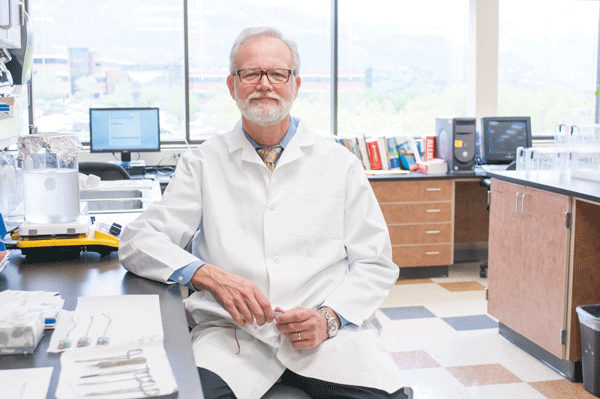The UW School of Pharmacy is pleased to announce the appointment of H. Steve White, RPh, Ph.D. as the new chair of the School’s Department of Pharmacy, effective January 18, 2016.
White earned his baccalaureate degree in Pharmacy and a M.S. in Pharmacology at Idaho State University and began his career as a practicing pharmacist in the small town of Salmon, Idaho, until his mentor invited him to a career-changing pharmacology conference. From there, he earned his Ph.D. in Pharmacology at the University of Utah where he rose through the academic ranks after joining the College of Pharmacy faculty in 1986.
“It gives me great pleasure to welcome Steve White to the University of Washington School of Pharmacy,” said UWSOP Dean Sean D. Sullivan. “A nationally-known researcher, responsible for significant advancement in the treatment and prevention of epilepsy, Dr. White is a compassionate leader and a great colleague with a passion for collaboration, science, patient care and student mentoring. I look forward to working with him as we continue to grow our School’s mission as a global leader in pharmacy education, research and service.”
A leader in translational research in anticonvulsant drug therapies, White is the principal investigator and scientific director of the NIH-sponsored Anticonvulsant Drug Development (ADD) Program that was established in 1975 to identify novel anticonvulsant drugs using established animal seizure and epilepsy models. Over the years, the efforts of this program have contributed to the successful development of nine new antiepileptic drugs for the treatment of refractory partial epilepsy including felbamate, rufinamide, topiramate, retigabine and lacosamide.
White’s research is focused on understanding the factors that contribute to the initiation, propagation, and amelioration of seizure activity. He has collaborated with faculty from UW School of Pharmacy’s Department of Pharmaceutics, including Associate Professor Nina Isoherranen and Professor Emeritus Rene Levy.
His laboratory, which will relocate to the UW as a partnership between the School of Pharmacy and UW Medicine, features a broad-based research program aimed at gaining a further understanding of the factors that contribute to the expression and prevention of seizure activity. The results obtained from these investigations are likely to lead to the design and development of more efficacious and less toxic therapies for the prevention and treatment of epilepsy.
“The University of Washington School of Pharmacy has provided significant leadership to the profession of pharmacy and played a critical role in the education of the next generation pharmacists, educators and researchers,” observed White. “In support of this mission, I look forward to working closely with the faculty and other invested stakeholders in the execution of the School’s Strategic Plan. The vision set forth by this thoughtful five-year plan will benefit students, patients and the pharmacy community for decades to come.”
In 2014, he was named the 2014 recipient of the Epilepsy Foundation’s Lifetime Accelerator Award, in recognition of his commitment and pioneering contributions to the field of epilepsy and seizures. In 2011, White received an Honorary Doctor of Science from The University of Copenhagen Faculty of Pharmaceutical Sciences, Copenhagen, Denmark.
White has been the recipient of significant research funding from the National Institute of Neurological Disorders and Stroke (NINDS), National Institutes of Health (NIH), and he and his collaborators have published over 170 original papers pertaining to the mechanism of action and the pharmacology of antiepileptic drugs. In addition to his academic service, he has served as Research Director of CURE (Citizen’s United for Research in Epilepsy), the largest non-governmental provider of epilepsy research funding, since November 2011 where he has assisted in the development of strategic programs that advance transformative epilepsy research that may someday lead to a cure or disease modifying therapy for the patient at risk for developing epilepsy. He has been a co-organizer of two NIH-sponsored workshops on models of refractory epilepsy and epileptogenesis and currently serves on the organizing committee of the biannual Eilat Conferences on Antiepileptic Drug Development. Additionally, White has been actively engaged as a mentor for the next generation of neuroscientists and epilepsy educators and is frequently invited to speak at national and international congresses.
* * *
The UW School of Pharmacy is comprised of three departments: Medicinal Chemistry, Pharmaceutics, and Pharmacy, offering Ph.D., M.S., and PharmD degrees, post docs and certificate programs. The Department of Pharmacy leads in pharmacy education, research, professional and outreach initiatives, including the Pharmaceutical Outcomes Research & Policy Program (PORPP), which conducts research in pharmaceutical economics, drug safe and pharmaceutical policy. The department supports general and specialized pharmacy residencies, and research fellowships in select areas of pharmacotherapeutics. The department educates 60 students in Ph.D. and M.S. programs, 177 in certificate programs, has 8 post docs, and, with MedChem and Pharmaceutics, contributes to the training and education of 386 PharmD students in the 4-year professional program.
The UW School of Pharmacy is a global leader in pharmacy education, research and service, committed to providing a transformative learning experience in a collaborative and diverse environment focused on improving the health and well-being of the communities we serve. Our mission is three-fold: inspiring education: developing exceptional, innovative and diverse pharmacy leaders and scientists; discovering solutions: advancing the science, development, implementation, and outcomes of safe and appropriate treatments; and serving people and communities: promoting the health and well-being of the public, locally and globally.
